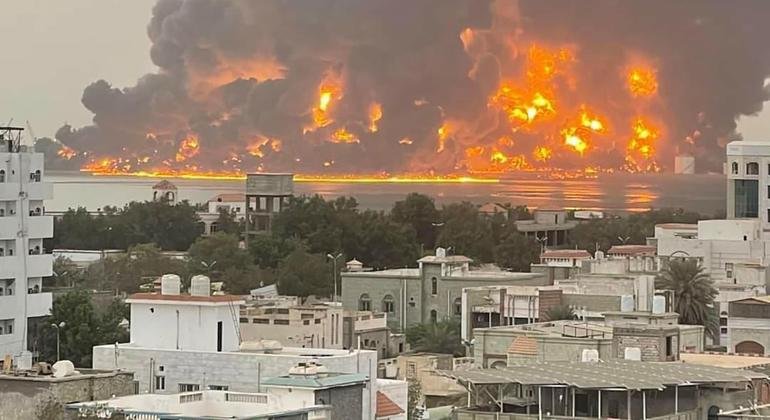Overview of the Current Situation
Recently, the conflict in Yemen has escalated dramatically due to a series of Israeli air strikes targeting Houthi rebel positions. The air strikes reportedly took place in strategic locations across northern Yemen, specifically aimed at military installations associated with the Iran-backed Houthi movement. These actions have raised alarms among international observers and local populations alike, as they mark a significant escalation in the regional conflict.
The timeline of these events began with the Houthis launching missile strikes aimed at Israeli shipping interests in the Red Sea. Responding to these provocations, the Israeli Defense Forces executed air strikes on key Houthi infrastructure, emphasizing their commitment to countering threats against their national security. Within a short period, various reports indicated that these air strikes led to substantial damage to Houthi capabilities, although the exact casualty figures remain unclear.
This military engagement has occurred against the backdrop of a protracted civil war in Yemen, which has entered its eighth year. The conflict, stemming from the struggle between the Houthi movement and the internationally recognized Yemeni government, has resulted in a humanitarian crisis recognized as one of the worst in the world. As the situation escalates, the involvement of external actors like Israel, who has historically focused on its territorial integrity and security, adds a complex layer to the already volatile environment of Yemen.
The significance of these military actions cannot be overstated. The Israeli air strikes may further destabilize a region already plagued by conflict while increasing the potential for retaliatory strikes from Houthi forces. This dynamic threatens not only the immediate safety of the Yemeni populace but also has broader implications for regional stability and geopolitical relations. The intricate intertwining of local and international interests necessitates a careful examination of these developments.
International Response and Implications
In recent weeks, the international community has closely monitored the escalation of hostilities involving Israeli air strikes in Yemen and subsequent Houthi missile launches. The UN Secretary-General has articulated grave concerns regarding these developments, emphasizing their potential violations of international humanitarian law and the risks posed to civilian populations. The Secretary-General’s statement highlighted the urgent need for all parties involved to adhere to established legal frameworks designed to protect non-combatants in conflict zones.
Various countries and international organizations have responded to these events with a mix of condemnation and calls for restraint. Nations such as France and the United Kingdom have reiterated the importance of maintaining the principle of proportionality in military engagement, urging all parties to de-escalate tensions. Additionally, regional players have underscored the detrimental effects that prolonged conflict may have on humanitarian efforts and peace negotiations. The Arab League issued a statement denouncing the air strikes and the missile attacks, emphasizing the necessity for dialogue as a means to resolve the ongoing crisis.
The implications of these military actions extend beyond immediate humanitarian concerns. They pose challenges to existing diplomatic initiatives aimed at resolving the Yemeni conflict, which has drawn international focus for nearly a decade. Heightened military activity risks further entrenching positions of opposing factions, complicating mediation efforts. With the specter of continued violence on the horizon, the potential for a renewed cycle of escalation invites scrutiny of geopolitical alliances and the broader power dynamics within the region.
The situation remains fluid, with ongoing discussions among stakeholders underscoring the pressing need for a comprehensive approach to the conflict in Yemen. The international community faces the critical task of balancing geopolitical interests while fostering an environment conducive to peace and stability. Policymakers must consider the humanitarian implications of their responses to prevent an exacerbation of the crisis and to uphold the tenets of international law.
Humanitarian Consequences
The recent air strikes in Yemen have resulted in devastating humanitarian consequences, significantly impacting the population and escalating an already dire situation. Civilian casualties have regrettably increased, raising alarm among international observers, including the UN Secretary-General. Reports indicate that non-combatants, including women and children, have been caught in the crossfire, exacerbating the suffering of a population that is largely dependent on humanitarian assistance. This tragic reality underscores the urgent need for all parties to adhere strictly to international humanitarian law, which mandates the protection of civilians in conflict zones.
Moreover, the air strikes have inflicted severe damage on critical infrastructure, including hospitals, schools, and housing facilities. This destruction has not only impeded the delivery of essential services but has also hindered humanitarian organizations’ capacity to operate effectively in the region. The Red Sea ports, vital for the importation of food and medical supplies, have felt the repercussions as attacks disrupt logistics and contribute to growing supply shortages. In a nation already suffering from famine and disease, these conditions render millions of people more vulnerable than ever.
The implications of these strikes extend beyond immediate casualties; they threaten to plunge Yemen further into humanitarian catastrophe. The situation is compounded by the responsibilities of both conflicting parties to ensure that humanitarian access is unhindered, allowing aid to reach those most in need. As the international community watches closely, it is imperative for all involved to prioritize the protection of civilians and infrastructure, thereby alleviating the extraordinary burden on the Yemeni people. Failure to do so risks undermining any hope for peace and recovery in this war-torn area.
Call for Restraint and Path Forward
In the wake of the recent Israeli air strikes in Yemen, the United Nations Secretary-General has emphasized the urgent need for all parties to exercise restraint and prioritize dialogue. The escalation of hostilities poses a significant threat to the already fragile peace in the region. The Secretary-General has reiterated his commitment to fostering an environment conducive to negotiations, highlighting that sustainable peace can only be achieved through open communication and mutual understanding. As tensions rise, the importance of dialogue becomes increasingly critical in preventing further escalation.
The role of the UN, particularly that of the Special Envoy for Yemen, is instrumental in mediating efforts towards peace. The Secretary-General has called upon the Special Envoy to intensify engagement with conflicting parties in order to facilitate dialogue and reconciliation. However, challenges abound, as heightened military activities have created a more complex environment for diplomacy. The ongoing air strikes not only exacerbate existing tensions but also impede the avenues for constructive negotiations. This delicate situation requires a concerted effort from all stakeholders to reduce hostilities and return to a diplomatic framework.
Moreover, the Secretary-General has highlighted the need for the immediate release of individuals who are arbitrarily detained. The arbitrary detentions further complicate the peace process, as they breed mistrust among the affected communities and the governing authorities. Ensuring the rights and freedoms of detained personnel is essential for building a foundation of trust that is necessary for any productive dialogue. In conclusion, the return to diplomatic solutions is imperative for stabilizing Yemen. The international community must stand united in supporting the calls for restraint and encouraging a peaceful resolution to the crisis, fostering conditions that prioritize the well-being of the Yemeni people.

 from Africa, Asia and United Nations here for your comfort in different languages, but you can click on our translator in different languages on our Website.
from Africa, Asia and United Nations here for your comfort in different languages, but you can click on our translator in different languages on our Website.
